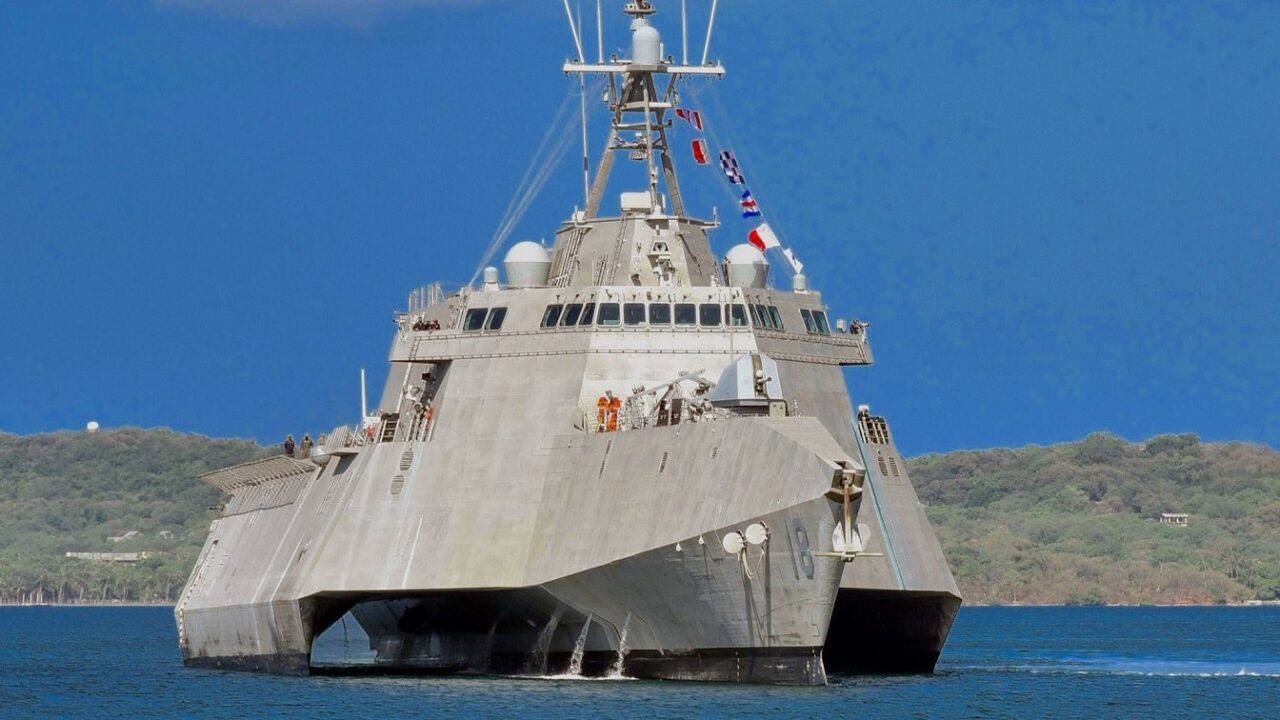File this under more problems for the U.S. Navy’s Littoral Combat Ship (LCS) program. An LCS that is only four years old had an issue in its engine room in October and the Navy investigated throughout November to get a better handle on what happened. The USS Wichita was sailing back from deployment when it became incapacitated for two days. Without citing details, the Naval Safety Command has already classified the incident with the propulsion system as a “Class A mishap.” This is a status level that is incurred when there is at least $2.4 million in damages.
Littoral Combat Ship Limping Home After Successful Mission
LCS Wichita, a Freedom-class vessel, was able to make it back to its home port of Mayport, Florida. On the upside, the Wichita performed well in its deployment to the Caribbean Sea for a narcotics interdiction mission. The ship worked with the 4th Fleet and Southern Command to help seize 10,000 pounds of cocaine worth $316 million.
Is the LCS Reliable?
Wichita and other Freedom-class Littoral Combat Ships have experienced thorny problems with their combining gear. The combining gear comprises a system that can be compared to a transmission that transfers power from two gas turbine engines to “two main propulsion diesel engines to the ship’s propulsion shafts.” This issue also negatively affects the speed of the LCS.
While the Navy said that the Wichita had not been afflicted by combining gear issues, the problem has dogged other Littoral ships leading to breakdowns. Wichita still needs to have its combining gear replaced.
Just Put the Ships Out of Their Misery
This could be the end of Wichita and its sister ships in the Freedom-class. The Navy wants to de-commission nine of the vessels in the FY23 National Defense Authorization Act. The U.S. House of Representatives amended the NDAA to only include eliminating four littoral combat ships.
Pros and Cons of the Littoral Combat Ship
Proponents of the LCS have pointed to its success with drug interdiction duties, but detractors believe that mechanical failures hurt reliability. When it was devised, the LCS was seen as a great choice for service in the war on terror. Iraqi insurgents, the Taliban, and al-Qaeda had no navies and the LCS could come close to shore and serve as counter-terror and counter-insurgency vessels plus execute anti-narcotics and anti-piracy missions. Now the threat environment has changed to include countering large navies and capital ships from Russia and China. The LCS would be at a disadvantage against larger vessels and submarines. The Navy wants to shift savings from LCS cancellations to other ship acquisition programs.
Use It or Lose It
The Navy would like the LCS to transition to anti-submarine duties but that hasn’t worked out as planned. One option calls for selling the small ships to South American navies that could use the platforms to battle cartels in their battles against drug runners. That would be better than scrapping them entirely.
Some Members of Congress believe that this is not the time to take any combat vessels off the table as China has the largest navy in the world and is producing new ships in impressive numbers. As Senator Roger Wicker of Mississippi said in an interview with Task & Purpose, “They are still functional and could provide important deterrence value against China.”
The Best Thing Is to Agree on a Compromise
Another option is to keep the Independence-class LCS roaming the Western Pacific and outfit it with the Naval Strike Missile for use against China. The Navy and Congress could seek to compromise and choose different outcomes for different ships. Some could be scrapped, some could be sold, others could serve on anti-submarine duties, while six could be outfitted with stand-off missiles.
The LCS saga is another example of how the force posture of the Navy is not clear and there are policymakers and Navy brass who do not agree on how ships will be used and how many combat vessels will be de-commissioned or built. There are too many cooks in the kitchen (or galley), and it seems the Chinese have no similar problems with their navy and ship-building programs.
Expert Biography: Serving as 1945’s Defense and National Security Editor, Dr. Brent M. Eastwood is the author of Humans, Machines, and Data: Future Trends in Warfare. He is an Emerging Threats expert and former U.S. Army Infantry officer. You can follow him on Twitter @BMEastwood. He holds a Ph.D. in Political Science and Foreign Policy/ International Relations.

